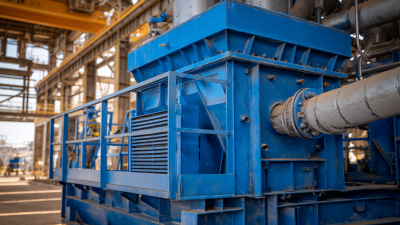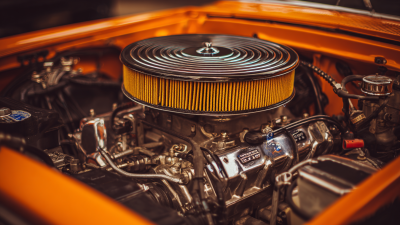In the world of HVAC systems, the significance of AC filters cannot be overstated. According to a report by the U.S. Department of Energy, approximately 30% of energy used in heating and cooling systems can be attributed to poorly maintained or dirty filters, leading not only to increased energy costs but also to decreased system efficiency. Additionally, the American Lung Association states that indoor air quality can be compromised by inadequate filtration, affecting overall health. As we explore common issues with AC filters, it is crucial to understand how these barriers to peak performance can lead to substantial inefficiencies and health risks. By employing top strategies for maintenance and management of AC filters, homeowners and businesses alike can optimize their HVAC systems, ensuring clean air, cost savings, and enhanced comfort.

When it comes to maintaining your air conditioning system, understanding the common issues associated with air filters is essential for both efficiency and longevity. Different types of AC filters, such as HEPA, electrostatic, and pleated filters, come with their own set of potential problems. For example, HEPA filters are great at capturing small particles but may restrict airflow if not replaced regularly. Conversely, pleated filters can become clogged quickly in dusty environments, leading to higher energy costs and reduced cooling effectiveness.
To ensure optimal performance, it's crucial to monitor your AC filters regularly. Replace standard filters every 1-3 months, while HEPA filters might require replacement every 6-12 months depending on usage. To enhance filter lifespan, consider investing in washable filters that can be reused, reducing waste and costs in the long run. Additionally, always check for proper installation; an improperly fitted filter can allow unfiltered air to bypass the system, negating its effectiveness.
Tip: Keep a schedule for checking your filters based on seasonal usage. If your AC runs frequently in hot months, inspect them monthly to catch any buildup early. A simple routine can prevent major issues and maintain your system's efficiency, providing you with a cooler and more comfortable home.
| Filter Type | Common Issues | Symptoms | Solutions |
|---|---|---|---|
| Fiberglass Filters | Low filtration efficiency | Increased dust accumulation | Replace with higher-grade filter |
| Pleated Filters | Clogging | Reduced airflow | Regular cleaning and replacement |
| HEPA Filters | High resistance to airflow | Increased energy consumption | Use in compatible systems only |
| Activated Carbon Filters | Reduced odor removal efficiency | Persistent odors in indoor air | Replace filter more frequently |
| Electrostatic Filters | Static charge loss | Increased allergens in air | Clean regularly; inspect for damage |
When it comes to air conditioning systems, the effectiveness of filters plays a crucial role in maintaining air quality and system efficiency. Two popular types of filters are pleated filters and fiberglass filters, each offering distinct advantages and disadvantages. Pleated filters, often made from a blend of paper and synthetic materials, are known for their superior dust and allergen capture capabilities. Their dense material increases surface area, allowing them to trap smaller particles more effectively compared to their fiberglass counterparts. This can lead to cleaner air, making pleated filters an excellent choice for allergy sufferers.
On the other hand, fiberglass filters are more affordable and convenient, ideal for those on a budget. While they do an adequate job of filtering larger particles, their efficiency diminishes significantly when it comes to finer pollutants. This means that although they may require more frequent replacement, they can be a practical option for homeowners looking for basic protection against dust and debris. Ultimately, the choice between pleated and fiberglass filters will depend on your specific needs, such as budget, air quality priorities, and the frequency of maintenance you’re willing to commit to.
When considering air conditioning filters, understanding MERV (Minimum Efficiency Reporting Value) ratings is crucial for optimizing air quality in your home. MERV ratings range from 1 to 20, with higher values indicating greater filtration efficiency. Filters rated between 1 and 4 are designed primarily for protecting HVAC systems from dust and debris, while those rated from 5 to 13 can trap finer particles such as mold spores and pet dander. For individuals with allergies or respiratory conditions, selecting a filter with a MERV rating of 13 or higher can significantly enhance indoor air quality.
However, increasing the MERV rating comes with considerations. High-efficiency filters can restrict airflow if not matched properly with your HVAC system, potentially causing strain on the unit and reducing its lifespan. It's essential to ensure that your system is compatible with high-MERV filters to maintain efficiency and avoid unnecessary repairs. Homeowners should balance their need for cleaner air with the operational capabilities of their HVAC systems for an effective indoor environment. Understanding MERV ratings allows you to make informed decisions, ensuring both effective filtration and optimal system performance.

When it comes to maintaining an efficient air conditioning system, the choice of filter material plays a crucial role in both cost and performance. Different AC filter materials offer varying levels of filtration efficiency, durability, and price points. For instance, fiberglass filters are often the most affordable option but tend to have lower efficiency, typically capturing only large particles. This means they may require more frequent replacements, potentially increasing long-term costs.

On the other end of the spectrum, high-efficiency particulate air (HEPA) filters, while initially more expensive, provide superior air quality by capturing up to 99.97% of airborne particles. This enhanced performance can lead to reduced energy costs as the AC unit doesn’t have to work as hard to circulate air. Additionally, reusable electrostatic filters strike a balance between cost and efficiency, offering good filtration while being washable and therefore more sustainable. Understanding the longevity and performance of these different AC filter materials is essential for homeowners looking to optimize their HVAC systems while keeping budgetary constraints in mind.
When it comes to maintaining your air conditioning system, the choice between regular maintenance and replacement of AC filters is crucial. Regular maintenance typically involves cleaning or replacing filters to ensure optimal airflow and efficiency. Clean filters are essential not only for the performance of the unit but also for improving indoor air quality. When filters are clogged with dust and debris, the air conditioner has to work harder, leading to higher energy bills and potential damage to the system.
On the other hand, knowing when it's time to replace your filters is equally important. If you're frequently cleaning your filters but still experiencing poor air quality or reduced efficiency, it might be indicative of filters that have reached the end of their lifespan. Replacing outdated filters can significantly enhance air purification efforts, helping to remove allergens, dust, and other pollutants from the environment. By making informed decisions about maintenance versus replacement, you can ensure your AC system runs efficiently while providing a healthy living space.






